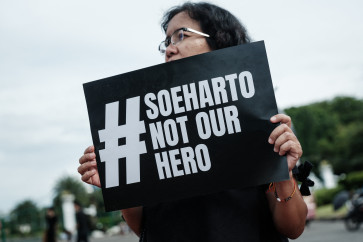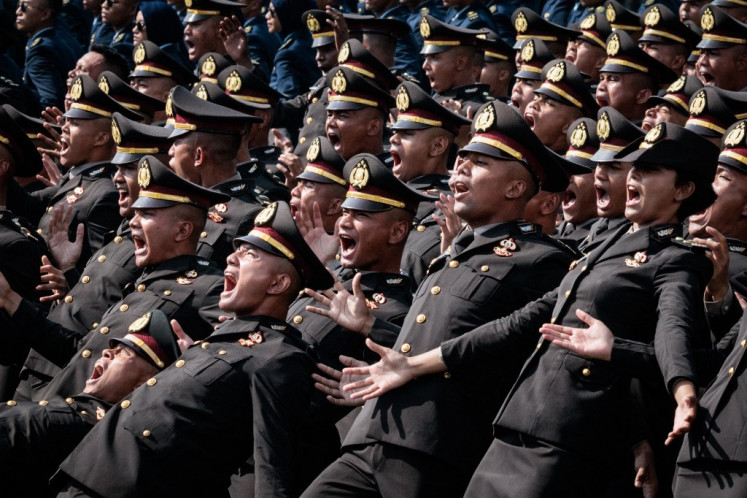Popular Reads
Top Results
Can't find what you're looking for?
View all search resultsPopular Reads
Top Results
Can't find what you're looking for?
View all search resultsUnder Khun Surin, ASEAN ‘flourished’ with activism
In his place: ASEAN Secretary-General Lim Jock Hoi walks down from the podium after delivering remarks on Monday in Jakarta, paying tribute to his predecessor Surin Pitsuwan, who passed away last year
Change text size
Gift Premium Articles
to Anyone
I
n his place: ASEAN Secretary-General Lim Jock Hoi walks down from the podium after delivering remarks on Monday in Jakarta, paying tribute to his predecessor Surin Pitsuwan, who passed away last year.(Antara/Sigid Kurniawan)
ASEAN has overcome its noninterference principle to play a more engaging role with civil society, thanks in no small part to former secretary-general Surin Pitsuwan, several prominent speakers have said in tribute to the late ASEAN great.
Surin, a Thai diplomat who led ASEAN from 2008 to 2012, had played an important role in strengthening ties of ASEAN members with each other and with the global community, said Hidetoshi Nishimura, president of the Economic Research Institute for ASEAN and East Asia (ERIA).
“[He] was passionate about maintaining networks with civil society organizations. He transformed the ASEAN Secretariat into a networking center by strengthening ties among ASEAN member states and with [others around] the world,” Nishimura said on Monday at an event in Jakarta.
Khun Surin, who died of a heart attack at the age of 68 on Nov. 30 last year, encouraged the bloc to assume a more activist role, paving the way for reforms in the organization’s engagement with Myanmar, Nishimura said.
He was widely credited with leading ASEAN to a major breakthrough in the handling of the 2008 cyclone Nargis, at a time when Myanmar was reluctant to allow international humanitarian agencies to deliver aid.
Led by Surin and some member states, including Indonesia, ASEAN negotiated a tripartite approach with Myanmar and the United Nations to oversee humanitarian operations in the country, allowing for the relevant agencies to get assistance to those in desperate need.
Foreign policy expert Dewi Fortuna Anwar of The Habibie Center echoed Nishimura’s remarks, saying Khun Surin had taken the lead in persuading ASEAN member states to broach a number of difficult issues with Myanmar, in spite of ASEAN’s knack for noninterference.
She said he had encouraged member states to push Myanmar’s military junta to ease its tight grip on governance and release political prisoners, including eventual civilian leader Aung San Suu Kyi.
“While many other ASEAN foreign ministers remained hesitant, he promoted the idea of ASEAN’s ‘constructive engagement’ with Myanmar, later softened to ‘flexible engagement’ or ‘enhanced interaction’,” Dewi said on Monday, adding that his actions vis-à-vis Myanmar had had a lasting impact on ASEAN as a whole.
She also said that during his tenure as ASEAN secretary-general, Surin worked had hard to transform the image of ASEAN from that of a purely government-driven organization to one that was more responsive to the needs of its peoples.
Surin’s legacy includes a study on how ASEAN could leverage itself as a network, which Dewi suggested current ASEAN Secretary-General Lim Jock Hoi should consider revisiting. The study advises the ASEAN Secretariat to establish a database of regional experts on various fields.
Meanwhile, Surin’s son Fuad Pitsuwan revealed that his late father had initially planned to establish a foundation before he died — the Pitsuwan Foundation was currently in the process of establishment.
The foundation, he said, was expected to serve people in the region in three fields: education, diplomacy and safety — all of which were his father’s main concerns.
“On education, the foundation aims to provide scholarships to students in the region to learn abroad, within or outside the region,” he said, adding that it was also set to provide funding for research in ASEAN. On diplomacy, the foundation aimed to introduce programs on interfaith dialogue and conflict resolution, as well as assisting in disaster relief as it pertains to safety.










